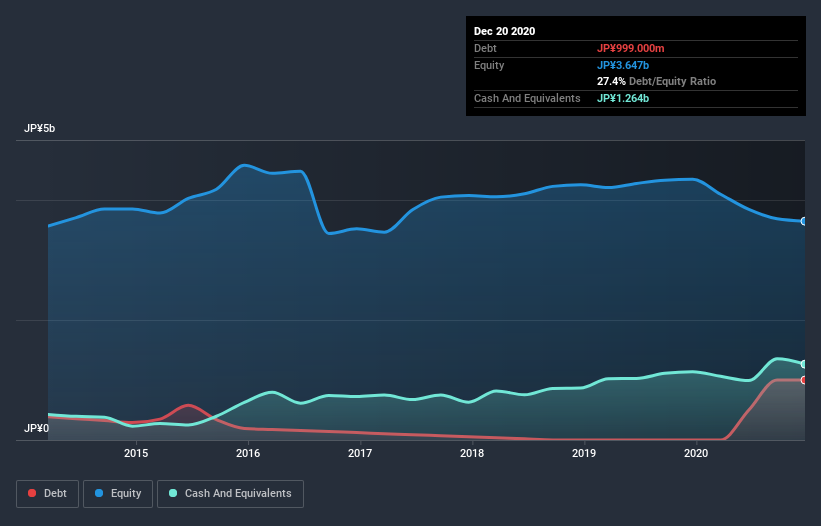Howard Marks put it nicely when he said that, rather than worrying about share price volatility, 'The possibility of permanent loss is the risk I worry about... and every practical investor I know worries about.' When we think about how risky a company is, we always like to look at its use of debt, since debt overload can lead to ruin. As with many other companies Hachi-Ban Co., Ltd. (TYO:9950) makes use of debt. But should shareholders be worried about its use of debt?
What Risk Does Debt Bring?
Generally speaking, debt only becomes a real problem when a company can't easily pay it off, either by raising capital or with its own cash flow. In the worst case scenario, a company can go bankrupt if it cannot pay its creditors. However, a more common (but still painful) scenario is that it has to raise new equity capital at a low price, thus permanently diluting shareholders. Having said that, the most common situation is where a company manages its debt reasonably well - and to its own advantage. When we examine debt levels, we first consider both cash and debt levels, together.
View our latest analysis for Hachi-Ban
What Is Hachi-Ban's Net Debt?
You can click the graphic below for the historical numbers, but it shows that as of December 2020 Hachi-Ban had JP¥999.0m of debt, an increase on none, over one year. However, its balance sheet shows it holds JP¥1.26b in cash, so it actually has JP¥265.0m net cash.

How Healthy Is Hachi-Ban's Balance Sheet?
We can see from the most recent balance sheet that Hachi-Ban had liabilities of JP¥1.35b falling due within a year, and liabilities of JP¥688.0m due beyond that. Offsetting this, it had JP¥1.26b in cash and JP¥675.0m in receivables that were due within 12 months. So its liabilities total JP¥97.0m more than the combination of its cash and short-term receivables.
This state of affairs indicates that Hachi-Ban's balance sheet looks quite solid, as its total liabilities are just about equal to its liquid assets. So while it's hard to imagine that the JP¥8.87b company is struggling for cash, we still think it's worth monitoring its balance sheet. While it does have liabilities worth noting, Hachi-Ban also has more cash than debt, so we're pretty confident it can manage its debt safely. When analysing debt levels, the balance sheet is the obvious place to start. But it is Hachi-Ban's earnings that will influence how the balance sheet holds up in the future. So when considering debt, it's definitely worth looking at the earnings trend. Click here for an interactive snapshot.
Over 12 months, Hachi-Ban made a loss at the EBIT level, and saw its revenue drop to JP¥6.3b, which is a fall of 25%. To be frank that doesn't bode well.
So How Risky Is Hachi-Ban?
We have no doubt that loss making companies are, in general, riskier than profitable ones. And in the last year Hachi-Ban had an earnings before interest and tax (EBIT) loss, truth be told. And over the same period it saw negative free cash outflow of JP¥633m and booked a JP¥496m accounting loss. Given it only has net cash of JP¥265.0m, the company may need to raise more capital if it doesn't reach break-even soon. Overall, we'd say the stock is a bit risky, and we're usually very cautious until we see positive free cash flow. When analysing debt levels, the balance sheet is the obvious place to start. But ultimately, every company can contain risks that exist outside of the balance sheet. Case in point: We've spotted 2 warning signs for Hachi-Ban you should be aware of, and 1 of them is concerning.
If, after all that, you're more interested in a fast growing company with a rock-solid balance sheet, then check out our list of net cash growth stocks without delay.
If you decide to trade Hachi-Ban, use the lowest-cost* platform that is rated #1 Overall by Barron’s, Interactive Brokers. Trade stocks, options, futures, forex, bonds and funds on 135 markets, all from a single integrated account. Promoted
Valuation is complex, but we're here to simplify it.
Discover if Hachi-Ban might be undervalued or overvalued with our detailed analysis, featuring fair value estimates, potential risks, dividends, insider trades, and its financial condition.
Access Free AnalysisThis article by Simply Wall St is general in nature. It does not constitute a recommendation to buy or sell any stock, and does not take account of your objectives, or your financial situation. We aim to bring you long-term focused analysis driven by fundamental data. Note that our analysis may not factor in the latest price-sensitive company announcements or qualitative material. Simply Wall St has no position in any stocks mentioned.
*Interactive Brokers Rated Lowest Cost Broker by StockBrokers.com Annual Online Review 2020
Have feedback on this article? Concerned about the content? Get in touch with us directly. Alternatively, email editorial-team (at) simplywallst.com.
About TSE:9950
Hachi-Ban
Engages in the restaurant management business in Japan and internationally.
Flawless balance sheet with questionable track record.
Similar Companies
Market Insights
Weekly Picks

THE KINGDOM OF BROWN GOODS: WHY MGPI IS BEING CRUSHED BY INVENTORY & PRIMED FOR RESURRECTION


Why Vertical Aerospace (NYSE: EVTL) is Worth Possibly Over 13x its Current Price


The Quiet Giant That Became AI’s Power Grid
Recently Updated Narratives

GE Vernova revenue will grow by 13% with a future PE of 64.7x

A buy recommendation

Growing between 25-50% for the next 3-5 years
Popular Narratives


MicroVision will explode future revenue by 380.37% with a vision towards success


NVDA: Expanding AI Demand Will Drive Major Data Center Investments Through 2026




